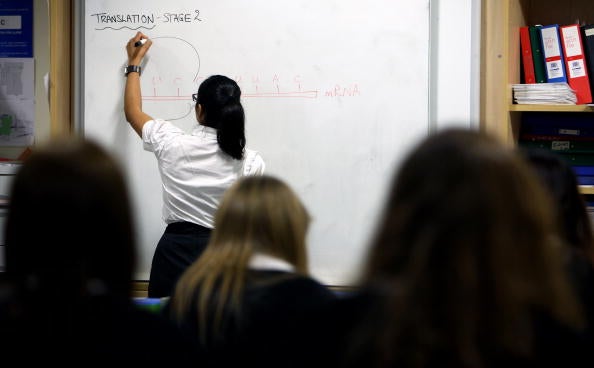White teachers are significantly more likely to doubt the ability of black students, study finds
Racial bias may not be limited to just the education system, say study co-authors

White teachers have significantly less faith in their black students’ academic success when compared with black teachers, a recent study has found.
Researchers in the US analysed data from an ongoing 2002 education study which followed 8,400 tenth-grade public school pupils. That survey asked two different teachers - who each taught a particular student in either maths or reading - to predict how far that one student would go in school.
Concerning white students, the ratings from both teachers were revealed to be the same. However, when it came to black pupils - boys in particular - the results were startlingly different: white teachers had much lower expectations than black teachers for how far the black students would go in school.
Published in the journal Economics of Education Review, co-author of the study and economist, Professor Nicholas Papageorge from Johns Hopkins University, described how white teachers and black teachers “systematically disagree” about the exact same student, insisting: “One of them has to be wrong.”
The overall conclusion from the study suggests that these low expectations could affect the performance of students, particularly those from disadvantaged backgrounds who lack access to role models, said Professor Papageorge.
He explained: “If I’m a teacher and decide a student isn’t any good, I may be communicating that to the student.
“A teacher telling a student they’re not smart will weigh heavily on how that student feels about their future, and perhaps the effort they put into doing well in school.”
Other key findings from the study showed how white and other non-black teachers were 12 per cent more likely than black teachers to predict black students wouldn’t finish high school, while non-black teachers were five per cent more likely to predict their black boy pupils wouldn’t graduate high school than their black girls.
While white male teachers were between ten to 20 percent more likely to have low expectations for black female students, maths teachers were significantly more likely to have low expectations for female students.
Another co-author, Dr Seth Gershenson from the American University, expressed concern over how the study’s findings may not be limited to the education system, but, in fact, may have infiltrated the workplace - and beyond.
He said: “While the evidence of systematic racial bias in teachers’ expectations uncovered in the current study are certainly troubling and provocative, they also raise a host of related, policy-relevant questions that our research team plans to address in the near future.”
Dr Gershenson confirmed that another study is currently underway, this time into the impact of biased expectations on students’ long-run outcomes such as educational attainment, labour market success, and interaction with the criminal justice system.
Join our commenting forum
Join thought-provoking conversations, follow other Independent readers and see their replies
Comments
Bookmark popover
Removed from bookmarks